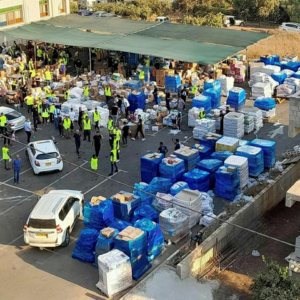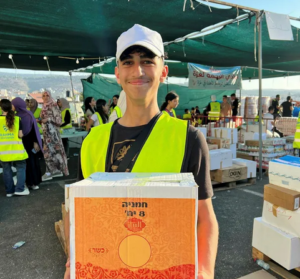‘More political than humanitarian’: aid campaigns for Gaza divide Palestinian Israelis

Donations for Gaza in Sakhnin in northern Israel, August 2024
Nagham Zbeedat reports in Haaretz on 22 August 2024:
“A bag of rice that feeds a child in Gaza is as valuable to me as a bag filled with gold,” said 13-year-old volunteer Ahmad Meari, from the northern Israeli city of Sakhnin, as he loaded boxes of aid intended for the enclave.
Meari was volunteering with the Michigan-based humanitarian organization Rahma Worldwide, one of several relief groups running humanitarian assistance campaigns focused on bringing food and essential items into Gaza. But while these efforts continue to mobilize thousands of people across Israel, Palestinian-Israelis have found themselves divided over some aspects of the campaign.
One of the organizations that has faced skepticism by some is Standing Together, the Arab-Jewish grassroots peace movement that has become one of the most visible groups on the ground, particularly when it enlisted volunteers to protect Gaza aid convoys that were being looted by right-wing Jewish activists.
Andrew Dittus, the group’s executive assistant, said the organization has been engaged in various pro-peace efforts since October 7, including organizing anti-war demonstrations, participating in weekly Saturday night protests against the government and running “protected presence campaign” through which groups of volunteers protect Palestinians threatened by violent settlers. One example is the Jerusalem Day Flag March, which often includes violent rampages through the city’s Muslim Quarter and racist chants against Palestinian residents of the city.
But the latest Gaza relief effort is “one of our biggest and most successful campaigns,” Dittus said, explaining that the organization has collected “supplies from Arab Israeli towns across the country” including “food, hygiene products and essential items.” Despite criticism on social media, turnout in these locations across Israel has been remarkable, he said. “Thousands of people have come out – far more than we expected.”
But for Mustafa Zoabi, a Palestinian activist and journalist for news website Arab48, the high turnout was primarily driven by “a desire to support Gaza, not to endorse the Standing Together movement,” which he claimed “doesn’t enjoy widespread popularity among Arabs and Palestinians in Israel.” The makeup of the group’s several thousand members is not publicly available. Zoabi cited instances where demonstrations in Arab towns which were organized by the movement saw participation mainly from its own activists, with little involvement from the local population.
While Palestinians in Israel are frequently denied the ability to protest the war, with police heavily repressing Palestinian-led demonstrations, he noted, Standing Together has been allowed to organize. “Why are such movements permitted to hold demonstrations opposing the war?” he asked, adding that this disparity highlights “the performative nature of these movements and their limited impact on addressing the real issues faced by Palestinians within Israel.” As part of the Palestinian community within the Green Line, which Zoabi said has its own “complexity and particularity,” these inequalities make the movement already suspect.

13-year-old volunteer Ahmad Meari at the Rahma Worldwide donation effort in northern Israel.
‘Conditioned coexistence’
On this issue, West Bank-based Palestinian-Israeli journalist Mustafa Qablawi said in a video on Instagram, “I need to feel comfortable enough to express myself freely – only then can we discuss the coexistence narrative.” Until that point, he said, attempts to bring Israelis and Palestinians together “cannot happen,” urging organizations and activists to cease their efforts to achieve what he called a “conditioned coexistence.”
For Zoabi, groups like Standing Together primarily serve to buoy Israel’s international image by projecting a “democratic image” that includes Arabs and women in prominent roles, offering as an example the case of Iman Khatib-Yassin a member of Knesset who was suspended following her denial of the killing of babies and rape by Hamas on October 7 (Khatib-Yassin apologized the same day).
Mohammed Hatem, an independent political journalist from Sakhnin, also expressed reservation about promoting and donating to Standing Together. The movement’s goals are “more political than they are humanitarian,” he argued. Despite the movement’s “stated goals of achieving Arab-Israeli peace,” it seeks to “carve out a political path by leveraging support from Arab communities in Israel,” he claimed. According to the Standing Together website, the group does not have political aspirations of its own but instead seeks to create a movement for Israelis to effect political change themselves.
Still, he dismissed claims that donating to the movement amounts to normalizing relations with Israel or hurting Gazans. “People who donated to the Standing Together movement did so with the sole intention of helping people in Gaza,” he said.
Dittus clarified that the movement is “actively opposing the [Israeli] government in every way possible.” Other citizens, however, believe that ensuring aid makes it to the people in Gaza should be the top priority of any relief effort, regardless of the organization behind it, and that humanitarian efforts should not become a battleground between activists.
One donor from Sakhnin told Haaretz that he would feel “more comfortable donating to Standing Together” than other groups, noting that the latter movement “has documented success in [helping] deliver aid to the Gaza Strip,” referencing its project to stop looting of the aid trucks and ensure their safe passage to the Strip. “In difficult and crucial situations, we have to be pragmatic,” he said. “Even if Israel only wants to polish its image, there are people dying in Gaza.” Weighing his options, he explained, “If not enough Palestinian entities can provide aid, one can accept the help of left-wing Israeli movements.”
Similarly, Moad T., a business owner and donor from Sakhnin who contributed two aid trucks filled with food, cleaning supplies, and other essentials, confirmed his support for humanitarian efforts: “Every human being who launches a relief campaign, regardless of their religion or race, and provides help – we will support them and donate to them.”
“Any campaign that aims to assist the people in Gaza and alleviate their hunger – we support it, whether led by Jews or Arabs, Christians or Muslims,” said Khirallah Shalaata, a teacher and organizer with Rahma Worldwide. “We will always raise the slogan of humanity.” The group led significant humanitarian efforts over the weekend in multiple Arabs cities and towns in Israel, including Sakhnin, Nazareth and Baka al-Garbiyeh, among others. “The turnout is beyond what we could have imagined,” Shalaata said, adding that supermarkets and corner stores were being emptied as people rushed to buy products to donate for the campaign.
For Palestinians in Gaza, responses to the aid campaigns varied. Mohammed, a 31-year-old Palestinian from Deir Al-Balah, in the central Gaza Strip, said “Any effort to alleviate our burden is essential as we face a war of starvation.” But, he conditioned, “Are these movements reliable? Did they provide clear documentation that aid reached those in need? Do they have guarantees from the Israeli side, since they control the borders?”
Ali, from the same city, said that “While it is preferable” to donate through a Palestinian organization, “we know you wouldn’t hesitate to do so, but you don’t have the opportunity and are forced to donate through alternative organizations.”
In contrast, Yousef, from Gaza City, emphasized the importance of carefully selecting which organizations to support “especially in contexts where there may be an overlap of political and humanitarian considerations.” He stressed the importance of avoiding political agendas that could exploit donations, adding, “If there are other solutions, it is better to use them so that we don’t serve the occupation by allowing it to portray itself as humanitarian while exterminating the Palestinian people.”
Palestinians and human rights groups have accused the Israeli military and police of deliberately failing to prevent right-wing activists from looting aid and attacking truck drivers. In May, two trucks were torched at the Tarqumiyah border crossing, near Hebron in the West Bank. “There were several settler groups destroying aid on its way to Gaza,” Dittus said. “The police weren’t really doing anything about it.”
For Rahma Worldwide, Shalaata explained, the organization is “employing a specialized team to monitor, accompany and ensure the safe passage of the [aid] trucks to the border.”
This article is reproduced in its entirety
